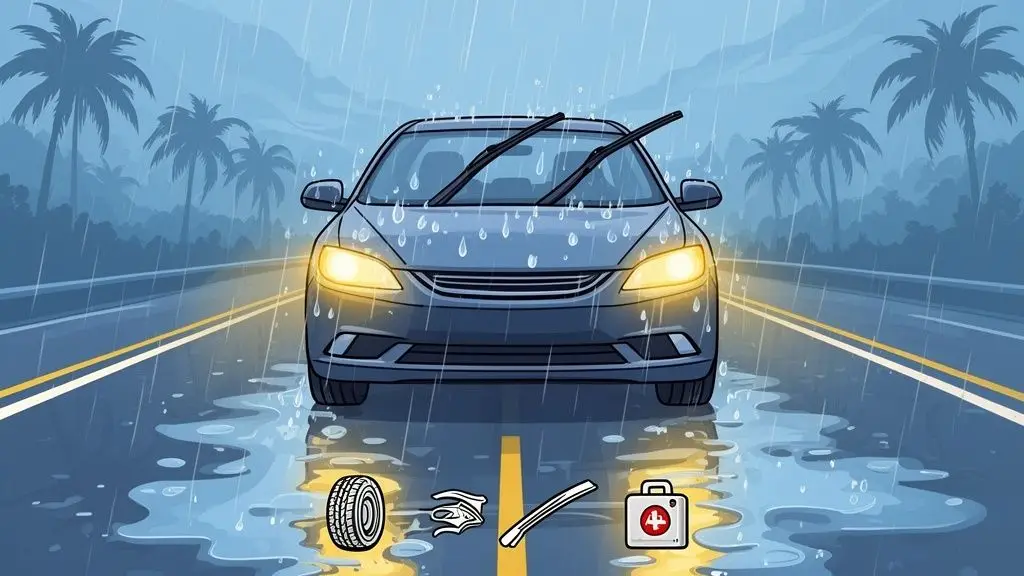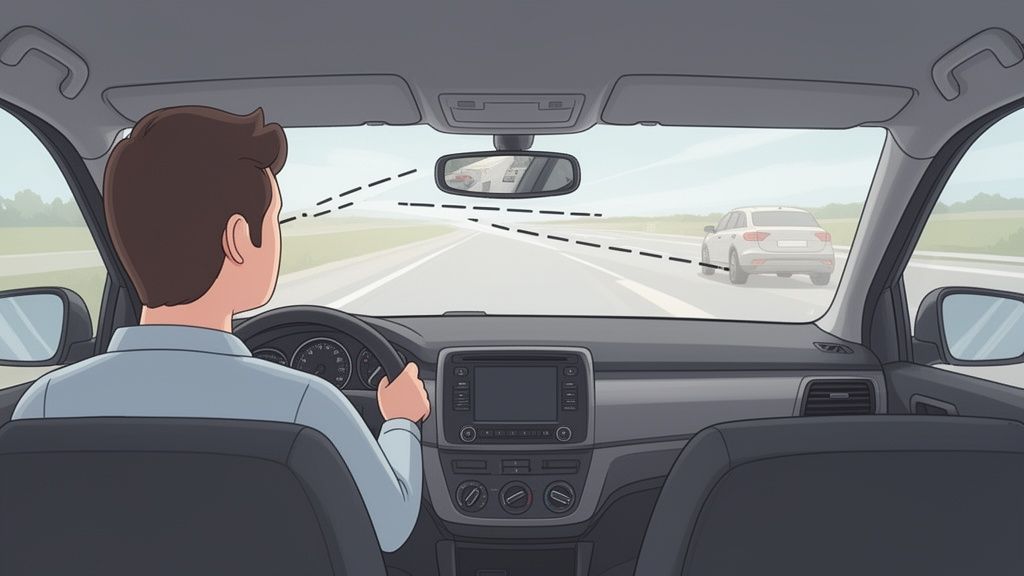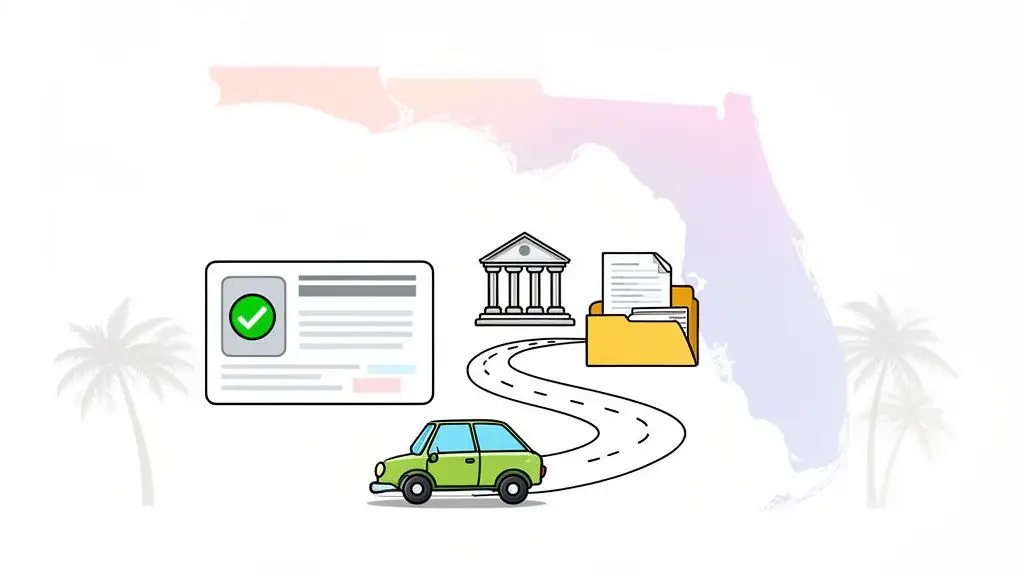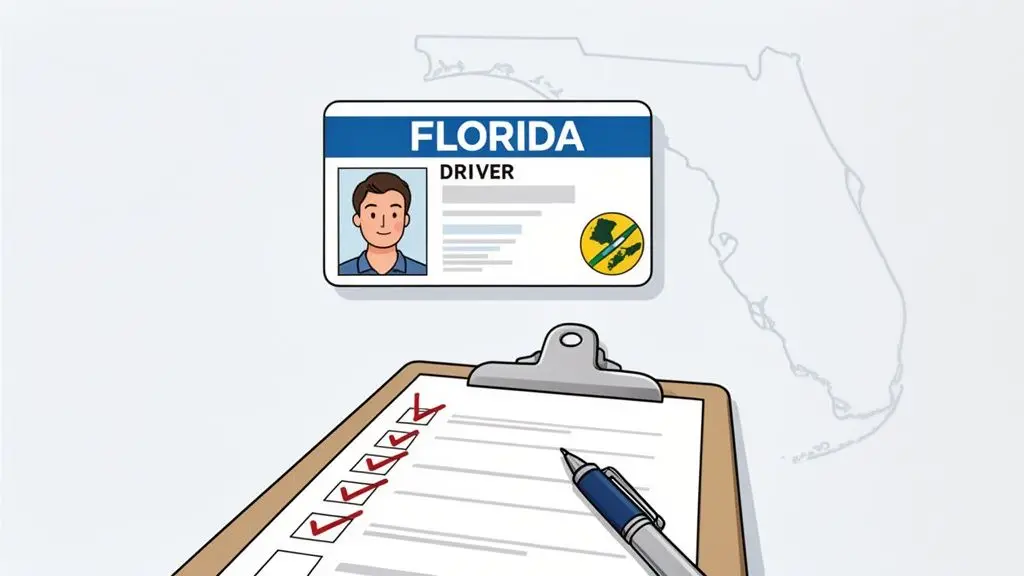Your Florida driving record check is way more than just a list of old traffic tickets. It’s the official story of your life behind the wheel, straight from the Florida Highway Safety and Motor Vehicles (FLHSMV). This report lays it all out—your license status, any violations, accident reports, and more. Think of it as a complete snapshot of your driving history.
Why Your Florida Driving Record Matters More Than You Think
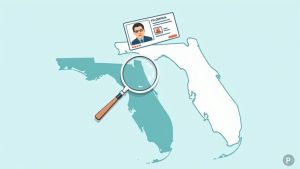
Most Florida drivers don’t give their driving record a second thought until it’s too late. But in reality, this document has a major say in your finances, your job prospects, and sometimes even your legal situation. For a Florida driver, not knowing what’s on your record can lead to some truly nasty surprises, like a sudden insurance rate hike or a rescinded job offer.
The Financial and Professional Impact
Here’s a practical example many Florida drivers face. You get a minor speeding ticket. To save a little time and hassle, you just pay the fine online and move on. A few months later, you get pulled over for another small infraction. Before you know it, a letter from your insurance company arrives, informing you of a 25% premium increase at your next renewal. Why? Those two “minor” tickets added enough points to your license to push you into a higher-risk category. This is a direct financial hit that could have been avoided.
This is exactly what happens when you don’t perform a regular florida driving record check. What you don’t know can, and often will, hit you right in the wallet.
Or consider this: a top-notch sales professional in Miami is interviewing for a great new job that comes with a company car. They nail the interviews and get a conditional offer. But then, it’s pulled. The company’s routine background check uncovered a driving record with too many points. It’s a hard lesson, but many jobs—not just those requiring a commercial license—demand a clean record. For Florida drivers, a clean record is a professional asset.
Your driving record is more than a history—it’s a living document that communicates your level of responsibility to insurers, employers, and even the courts. Ignoring it is like ignoring your credit score; the consequences often appear when you can least afford them.
Understanding What’s on Your Report
A Florida Motor Vehicle Report (MVR) gives you the full scoop. This is the official document maintained by the FLHSMV, and it’s packed with information:
- Your current license status
- Details on any DUI convictions
- A history of both moving and non-moving violations
- Crash reports
Since Florida’s Sunshine Law makes most of these records public, they’re often pulled by employers and other organizations to gauge how safe you are on the road.
It’s also worth noting how your driving record can come into play during legal proceedings like depositions, which really underscores its importance. A clean, well-managed record is your best defense against unexpected rate hikes and professional roadblocks. When you know exactly what’s on your report, you can take action—like enrolling in a basic driver improvement course to remove points—before a small issue snowballs into a major problem.
How to Get Your Florida Driving Record
Need a copy of your Florida driving record? Whether it’s for a new job, an insurance quote, or just to see where you stand, getting it is pretty straightforward. You’ve got a few options—online, by mail, or in person—and each has its own quirks when it comes to speed and cost. Figuring out which one is right for you just depends on how quickly you need it.
For most people, pulling your record online is the way to go. It’s fast, convenient, and gives you instant access. All you’ll need is your driver’s license number, date of birth, and the last four digits of your Social Security number to get started. The state’s official portal is designed for exactly this, making the florida driving record check a breeze.
Checking Your Record Online
The online process is all about speed. You plug in your info, pick the report you need, pay a small fee, and you’re done.
This graphic breaks down just how simple it is to get your report online. It’s a quick, three-part process.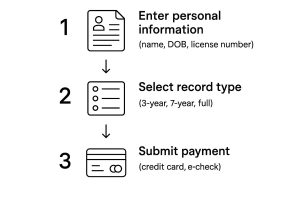
As you can see, the main things are choosing the right report type and having your payment info handy. This is why the online method is so efficient. You can check your Florida driver’s license status anytime you want directly on the official FLHSMV website.
Choosing the Right Report for Your Needs
Florida doesn’t just offer a one-size-fits-all report. You have a few options, and picking the right one is crucial.
- 3-Year History: This is perfect for a personal check-up or simple insurance questions. It gives you a quick snapshot of your recent driving habits.
- 7-Year History: Employers often ask for this one, especially if the job involves driving. It provides a more comprehensive look at your record.
- Complete History: This is the full rundown—your entire driving life. It’s typically required for Commercial Driver’s License (CDL) applications or for serious legal matters. A DUI, for example, stays on your Florida record for 75 years.
Florida Driving Record Check Methods at a Glance
To make the decision easier, here’s a quick comparison of the different ways you can get your Florida driving record.
| Method | Typical Speed | Associated Cost | Best For |
|---|---|---|---|
| Online | Instant | Low | Speed and immediate access |
| By Mail | 2-3 weeks | Moderate | When you need a certified copy and aren’t in a rush |
| In Person | Same-day | Low | Getting a certified copy quickly or paying with cash |
Ultimately, the best method depends entirely on your specific needs for speed, cost, and convenience. The online option is fantastic for quick, unofficial copies, while mail or in-person visits are better suited for official or certified requirements.
Found Points on Your Record? Here’s What to Do Next
If you pull your record and find some points or violations you weren’t expecting, don’t panic. The key is to take action to protect your license and your insurance rates. One of the best things you can do is enroll in a basic driver improvement course. By completing a florida traffic school online course, you can often prevent points from hitting your license in the first place, which is a huge help in keeping your insurance premiums down.
A proactive approach to managing your driving record is your best defense against unexpected consequences. By completing a basic driver course florida, you can often satisfy court requirements and demonstrate your commitment to safe driving.
Our florida online traffic school offers state-approved courses designed for different situations. At My Florida Traffic School, we’re here to help. You can explore your options on our courses page and, when you’re ready, head over to register.
What Am I Looking at? Making Sense of Your Florida Driving Record
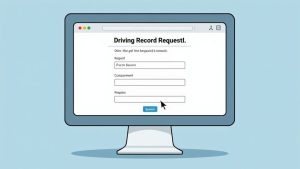
So, you’ve pulled your Florida driving record check, and now you’re staring at a document that looks like it’s written in code. It’s packed with dates, abbreviations, and legal jargon that can feel pretty overwhelming at first glance. Don’t sweat it. Learning to decipher your own record is the key to managing your driving history and keeping your license safe. Let’s walk through it piece by piece.
The first thing you’ll want to zero in on is the violations and points section. This is the heart of your record. Florida operates on a point system where every moving violation you’re convicted of adds points to your license. For example, a minor speeding ticket might only be 3 points, but something more serious like reckless driving will tack on 4 points.
Why do these points matter so much to a Florida driver? Because they have a direct and often immediate impact on both your insurance premiums and whether you get to keep your license. If you rack up too many points too quickly, a suspension isn’t a possibility—it’s a certainty.
Florida’s Point System and Suspension Thresholds
Every Florida driver should know these numbers by heart. The state doesn’t wait around to send you a warning letter; the suspensions are triggered automatically once you cross these thresholds. Knowing where you stand is your best defense against losing your driving privileges.
Here’s the breakdown:
- 12 points within a 12-month period: This gets you a 30-day suspension.
- 18 points within an 18-month period: You’re looking at a 3-month suspension.
- 24 points within a 36-month period: This triggers a full 1-year suspension.
It’s surprisingly easy to hit these limits. For example, a single ticket for leaving the scene of an accident with over $50 in damage is 6 points—that’s halfway to a suspension right there. If you’re ever unsure about your current status, you can always check it on the official FLHSMV website.
A word of advice from years of experience: don’t dismiss the “small stuff.” A seemingly minor ticket can be the one that pushes you over the edge, leading to a suspended license and skyrocketing insurance rates for years to come.
Minor vs. Major Offenses
Your report will categorize violations, and it’s important to know the difference. Minor infractions, like a broken taillight, are typically considered “non-moving” violations and won’t add points. The ones you really need to watch are the moving violations—things like running a red light, speeding, or failing to yield.
Then you have the major offenses, which are in a league of their own. A conviction for Driving Under the Influence (DUI) is one of the most damaging entries you can have. The statistics are sobering; in 2021 alone, Florida saw over 38,000 crashes involving DUIs. You can read more about the state’s DUI data to understand the full scope of the problem.
A DUI conviction will haunt your driving record for 75 years. The penalties are severe, including massive fines, license revocation, and mandatory Florida online traffic school.
If you do find points or violations on your record, the key is to be proactive. One of the best steps you can take is to voluntarily enroll in a basic driver improvement course. For many common tickets, completing a course from one of the state-approved florida approved traffic schools can actually prevent points from ever hitting your license in the first place.
Our basic driver course florida is designed for exactly this situation. Taking a Florida traffic school online is a simple, convenient way to satisfy court requirements, keep points off your record, and protect your driving privileges. Feel free to check out our available courses to see which one fits your needs.
Take Control with Florida-Approved Traffic School
Finding out you have a violation or seeing points pile up on your driving record can feel like a real gut punch. But it’s not a dead end. Think of it as a signal to take action. Signing up with one of the Florida approved traffic schools is one of the smartest moves you can make to protect your license, your wallet, and your driving privileges after getting a ticket.
This isn’t just about checking a box for the court; it’s about taking back control. A basic driver improvement course can be the one thing that stops points from ever hitting your license, which in turn helps keep your car insurance from skyrocketing. That’s a direct benefit for any Florida driver.
For example, imagine you got a ticket for going 15 mph over the speed limit. Paying the fine means an automatic 3 points and a likely insurance increase. But if you elect to take a basic driver traffic school florida course instead, you pay a reduced fine, complete the course online, and no points are added to your record. Your insurance company never even knows about it.
How a Basic Driver Improvement Course Really Helps
When you get a typical moving violation, just paying the fine is the same as pleading guilty. The court closes the case, and the points go straight onto your record. But when you choose to take a basic driver course florida, you change the outcome completely.
The biggest win here is point avoidance. When you pass a 4-Hour Basic Driver Improvement (BDI) course for an eligible ticket, the state withholds the points. No points are added. This keeps your record looking good to insurance companies, which is the key to preventing them from jacking up your rates.
On top of that, taking a course might be required by a judge or the state. Sometimes, a court will order you to complete a traffic school course as part of a sentence. Being proactive and signing up shows the court you’re serious about being a responsible driver.
Finding the Right Course for Your Situation
Not all traffic school courses are created equal. The right one for you depends entirely on your specific circumstances. At BDI School, we have different courses built to benefit every Florida driver’s needs.
Here’s a quick breakdown of the main courses we offer:
- 4-Hour BDI/TCAC: This is the go-to basic driver traffic school Florida course. Your benefit? Keep points off your license for a non-criminal moving violation, which prevents insurance hikes. It also satisfies a court order for a Traffic Collision Avoidance Course (TCAC).
- 8-Hour DDS/IDI Course: Your benefit here is satisfying a direct court order for more serious situations, like aggressive driving, helping you avoid further penalties like a license suspension.
- 12-Hour ADI Course: This Advanced Driver Improvement course is mandatory if your license was suspended or revoked. The benefit is clear: completing it is an essential step to getting your hardship license and ultimately reinstating your full driving privileges.
A Word of Caution: Choosing the right course is everything. For example, if your license is suspended, a 4-Hour BDI course won’t do you any good—you absolutely need the 12-Hour ADI to move forward. Always double-check which course you’re required to take before you sign up.
Taking control of your driving record starts now. When you’re ready to protect your record and keep your insurance rates from climbing, you can enroll in a driver safety course quickly and easily online.
Choosing the Right Florida Online Traffic School
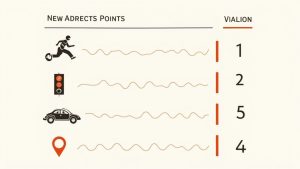
So, you’ve checked your Florida driving record and found something you need to address. What’s next? This is where picking the right Florida online traffic school course really matters. With so many options out there, it’s easy to get overwhelmed, but finding the perfect fit for your specific situation is the key to getting things resolved quickly and correctly.
Let’s say you got a ticket for a common moving violation, like speeding or rolling through a stop sign. In that case, the Basic Driver Improvement Course (BDI) is almost always your best bet. This is the standard 4-hour course that most Florida drivers use to keep points off their license. The benefit to you is clear: it protects your record and helps you dodge the car insurance hikes that usually come with a ticket.
But a 4-Hour BDI course isn’t a one-size-fits-all solution. Depending on your situation, you might need something more involved. Making sure you enroll in the right class from the start saves you from wasting time and money on a course that won’t satisfy the court or the state.
Matching Your Situation to the Right Course
The right Florida traffic school online for you depends entirely on what the court ordered or why your license is in trouble. Each course is designed for a very specific purpose and offers distinct benefits.
Here’s a simple breakdown of who needs which course and the benefits for Florida drivers:
- 4-Hour Basic Driver Improvement (BDI/TCAC):
- Who it’s for: You elected to take traffic school for a standard ticket, or a judge ordered you to complete a Traffic Collision Avoidance Course (TCAC).
- Your Benefit: No points on your license for an eligible ticket and no insurance rate increase. You maintain your clean record and save money.
- 8-Hour Driving School (DDS/IDI):
- Who it’s for: A judge specifically ordered you to complete an 8-hour course, usually for more serious violations or if you’ve had multiple tickets.
- Your Benefit: You satisfy a direct court order, showing responsibility and preventing harsher penalties like license suspension.
- 12-Hour Advanced Driver Improvement (ADI):
- Who it’s for: Your license has been suspended or revoked, or you’ve been labeled a Habitual Traffic Offender (HTO).
- Your Benefit: This is your path to getting back on the road. Completing the 12-Hour ADI is a mandatory step toward getting a hardship license and reinstating your driving privileges.
My Two Cents: Don’t ever guess which course you need. If a judge ordered it, your court paperwork will explicitly state whether you need the 4-hour, 8-hour, or another course. If your license is suspended, the 12-Hour ADI is your only option. Taking the wrong class is a frustrating waste of time—it simply won’t count.
If you’re ready to get started, you can learn more about our Florida online traffic school and see how we’ve made the process straightforward and painless for thousands of drivers.
Common Questions About Driving Records and Traffic School
Getting a traffic ticket can feel overwhelming, and it’s natural to have questions about what to do next. When your driving record is on the line, you need clear, straightforward answers to make the best decisions. Let’s walk through some of the most frequent questions we hear from Florida drivers.
Navigating Your Driving Record and Course Options
How long do points really stay on my Florida driving record?
This is a big one. For insurance rate purposes, points from a moving violation will affect you for at least five years. However, they stay visible on your complete driving history for much longer than that.
The key thing for Florida drivers to watch out for are the suspension triggers. If you rack up 12 points in 12 months, you’re looking at an automatic 30-day license suspension. This is precisely why electing to take a basic driver improvement course is so powerful—it can stop those points from ever hitting your record in the first place, saving you from suspension and higher insurance costs.
Can I just take a driver improvement course for any ticket?
Unfortunately, no. There are specific rules for eligibility. You can choose to take a basic driver course florida to avoid points only once within any 12-month period. You’re also capped at using this option five times in your entire lifetime.
Keep in mind, this option is off the table for more serious offenses. It doesn’t apply to criminal traffic violations like a DUI, and drivers with a Commercial Driver’s License (CDL) are generally not eligible to take a course to remove points.
What if a judge orders me to go to traffic school and I just… don’t?
Ignoring a direct court order is a move you definitely want to avoid. If a judge mandates a basic driver traffic school Florida course and you fail to complete it on time, the consequences are serious. Your driver’s license will be suspended, and you’ll likely be hit with extra fines and court fees.
The smartest way to handle any ticket is to act quickly. When you complete a course from one of the florida approved traffic schools, you’re not just checking a box for the court. You’re showing that you’re a responsible driver committed to safety.
For a deeper look into staying safe on the road, our guide on florida traffic safety for all drivers is packed with tips to help you maintain a clean record.
At BDISchool, our goal is to make meeting your traffic school requirement as painless as possible. Our state-approved courses are 100% online, so you can protect your license right from your own home. Register for your course today and take back control of your driving record.

